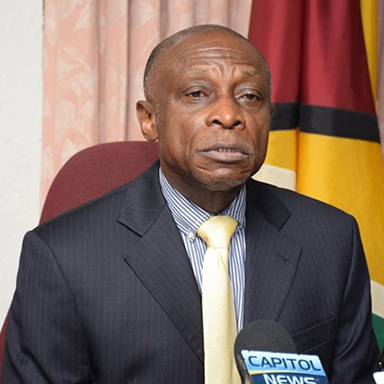Foreign Secretary Carl Greenidge has cautioned against the recent invocations of sovereignty by some, including senior government officials, who have sought to reject concerns voiced by the international community and CARICOM over the still to be settled March 2 elections.
“If you have acted properly, you don’t have to at the same time prove that you acted properly by censuring other people and shouting them down for voicing a view,” Greenidge, who is also Guyana’s Agent in the case before International Court of Justice aimed at settling the border controversy with Venezuela, said. “I see a lot of the arguments in Guyana, even by very senior officials in the country, about sovereignty, which are inappropriate,” he added.
Greenidge, who previously served as Foreign Affairs Minister, was speaking during an interview on a live APNU+AFC Facebook programme, where he was asked about the values that may guide the relations between states.
Attempts to manipulate outcome of the March 2 polls, where the opposition PPP/C secured the most votes according to a national recount, have prompted strong statements by the western diplomatic missions represented here, some CARICOM leaders, including outgoing Chair and Barbados Prime Minister Mia Mottley, and international bodies including the Commonwealth and the Organiza-tion of American States (OAS).
Greenidge said that any country that is a signatory to a treaty, such as the Treaty of Chaguaramas or a treaty on human rights or civil society agreement, is subject to the principles to which it subscribed. “And you cannot – and this is not going to make many Guyanese happy, at least those who are fond of writing in the papers on such matters – you do not have the right to censure other people for pronouncing or giving a view on such matters,” he said.
Also of import, he noted, is Guyana maintaining a consistent position. He reminded that Guyana was one of the countries that was “most vociferous” in the battle against apartheid in South Africa. “…The government of South Africa, which was a racist government, that government could not say, ‘Well, because we are the government, you all can’t say anything about it,’ because it touched on fundamental rights and principles,” he pointed out, before later noting that the Commonwealth has rules about how governments behave.
Greenidge also emphasised the need for Guyana to be consistent on the question of sovereignty in light of the case before the ICJ. Guyana, he said, expects to be able to call upon the international community to have Venezuela respect the rule of law and to take action should it fail to honour its obligations once the court pronounces. “If Venezuela ignores what the courts say and still then moves to stop Guyana using or having access to either its land resources or its… marine resources offshore, then the international community can be called on to take action and Venezuela cannot say ‘This is domestic legislation, it is our government that has taken that decision, [and] you all have no right to say anything, or ask us questions.’ … You have to be consistent in law,” he said. “It is in Guyana’s interest, as a country, to ensure that people don’t do things to us and then argue that, well, they have sovereignty,” he added.
He also used the example of the implementation of local policies that could impact on the country’s neighbours. “If you take action and it results in a flood of people into Barbados, you can’t be telling Trinidad and Tobago or Barbados’ government this is Guyana’s sovereignty because your people are moving in response to your measures or perceived to be moving. So one has to be very careful when you invoke these things to perhaps suit a specific topic because they may have implications for us. For Guyana, the rule of law, internationally, is our only protection. It is very, very important. As a small state, we have to be protected from bigger ones, whether they are super large or whether they are very large,” he further added.
With Guyana’s Chief Election Officer Keith Lowenfield moving to invalidate the votes of just under 116,000 voters from the final tally of the national recount, Mottley declared last week that no voter must be disenfranchised, while the US, Canada, the UK and the European Union said that every vote must be reflected in the final declaration.
She and the heads of the western missions, US Ambassador Sarah-Ann Lynch, British High Commissioner Greg Quinn, Canadian High Commissioner, Lilian Chatterjee, and the Ambassador of the European Union Fernando Ponz-Canto, have been accused of crossing a line and interfering in the country’s affairs due to the strong positions they have voiced.
In response to pushback by some government spokespersons on Mottley’s comments, she has stood by them, saying last week that “The truth hurts… The truth hurts but what we must never do in CARICOM is to avoid the truth and avoid our principles.”
Commonwealth Secretary-General Patricia Scotland has said that figures presented by the Chief Election Officer different from those of the recount would be “contrary to the fundamental principles which are treasured by the Common-wealth family and are enshrined in our Commonwealth Charter”.
“We call on all responsible parties to consider the consequences to Guyana’s reputation as a democratic country if such an approach was allowed to stand,” Scotland said in a statement last week.
“We commend the people of Guyana for your continued patience and peace and we encourage you to continue to do so. The Commonwealth Charter recognises the inalienable right of individuals to participate in democratic processes, in particular through free and fair elections in shaping the society in which they live and for this right to be protected and respected,” she added.
The OAS has called for the elections process to be “brought to an end, based on the results of the national recount.”









